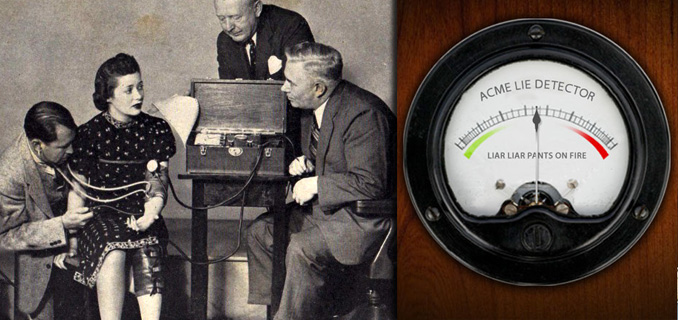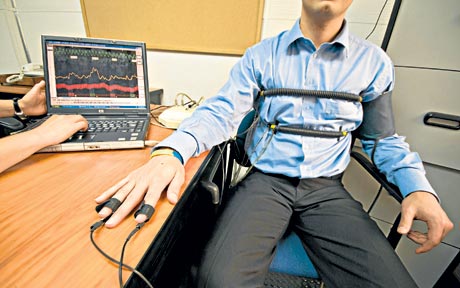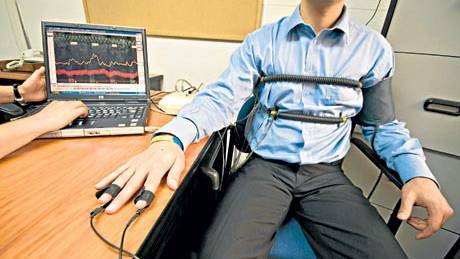The awkward truth about lie detectors
Source: blogs.telegraph.co.uk

Why are police forces trialling polygraph machines when many experts argue that they simply don’t work?
Polygraphs, the lie detector machines beloved of Fifties comic books and Jeremy Kyle shows, have a chequered history. American law‑enforcement agencies continue to use them, despite what critics claim is a lack of evidence that they actually work. Now our Government has announced plans to use them to help determine whether or not paedophiles and rapists should go back to jail.
The Ministry of Justice will allow probation officers to send paroled sex offenders back to prison if a polygraph finds they have been lying. This follows a pilot study by the University of Kent which found that offenders were twice as likely to offer “clinically significant disclosures” – such as an admission of entering an exclusion zone around a school – if they were subjected to polygraph tests.

This is the latest example of British law-enforcers adopting technologies and methods that many deride as flawed at best, pseudo-science at worst. Graphology (the study of handwriting to reveal personality), voice-stress analysis, even “mind-reading” magnetic resonance imaging (MRI) machines: all have been posited as methods for sorting the honest from the deceitful. And it is not just the police who have been seduced by these devices; the Department for Work and Pensions has used voice analysis in an attempt to detect benefits cheats.
Opponents of such technologies insist that the scientific evidence for their reliability is decidedly patchy. The MoJ programme has been criticised by Dr Sile Lane of the charity Sense About Science, who points to serious methodological flaws.
“The researchers downplay the bias of the observer, which surely should be a large concern since the research depended on offender managers deciding what was or wasn’t a clinically significant disclosure,” she says. The charity has published a paper, Sense About Lie Detectors, on the evidence and lack thereof for the techniques.
So how exactly is a lie detector supposed to work? And why are so many senior policemen and politicians apparently convinced of its effectiveness?
Polygraphs do not detect lies, but physiological proxies such as perspiration and heart rate. The technology relies on something called the Control Question Technique (CQT). The interrogator asks questions, some of which concern the incident under investigation, but also “control” questions which may, for example, be about other crimes, which the subject had nothing to do with, or more general stress-inducing questions like: “Have you ever lied to get out of trouble?”
The assumption is that guilty people will be more stressed when talking about real crimes than when answering the controls, and that innocent people will be equally stressed for both. Elevated responses that can be measured by a machine – such as faster heartbeat or increased perspiration (which increases electrical conductivity of the skin) – are taken as indicators of deception.
However, it’s difficult to be sure that these physiological changes are not indicators of stress that has no roots in guilt: understandably, someone being accused of lying to their probation officer can find themselves getting stressed very rapidly.
Dr Jamie Horder of King’s College London’s Institute of Psychiatry says that studying the effectiveness of polygraph technology is very difficult. “There have been studies in which you instruct some volunteers to try to conceal something, and you pay them if they are successful. But the problem is that the stakes are so small. You get maybe £20 or £50 if you beat [the machine], but in real life the stakes are much higher. And because the whole thing is based on emotion and stress, that’s really important.”
In fact it is possible to test the efficacy of polygraphs, but the trouble is such experiments are rare – at least according to Richard Wiseman, professor of the public understanding of psychology at the University of Hertfordshire. Because you can’t simply ask a criminal whether he was lying or not, the only method would be to use polygraphs in cases where the true answer had already been established using other evidence. Then it would be possible to check the polygraph’s responses against reality in a high-stakes situation. “If the examiner was unaware of the true answers, then that would be a proper double-blind scientific study. But there have been very few trials like that,” says Prof Wiseman.
From what evidence there is, he adds that “the polygraph seems to be very good at catching liars. But it seems very likely to give false positives as well, to ’catch’ people who are telling the truth”.
Horder agrees, pointing to research which found that polygraphs were “70-97 per cent accurate for people who turned out to be guilty, but between 12-94 per cent accurate for people who turned out to be innocent.”
Clearly, reliance on lie detectors makes it more probable that the innocent will be wrongly convicted. Furthermore, criminals can beat the test. “If you make yourself stressed for the control questions, then your stress on the investigative questions may not show up,” says Horder. “Methods include causing physical pain, say biting your tongue, or simply thinking about something stressful.”
Despite the apparent ease with which it can be subverted, use of the polygraph is becoming routinely accepted in Britain. Since 2002, police forces in Surrey, Northumberland, the East and West Midlands, Sussex, Devon, Lancashire, London and Hertfordshire have run trials of polygraph tests on sex offenders. “It’s remarkable how it’s kept cropping up,” says Horder. “It seems that once a year or so some service would trial it, then nothing much would happen, then a year later it would be trialled somewhere else.”
A spokesman for the Association of Chief Police Officers (Acpo) confirmed that polygraph tests may be considered for use by police, saying that they could become “another tool” for the management of sex offenders, and their introduction will be discussed at a conference in September.
Why does this apparently flawed technology refuse to die? Partly it’s our fascination with gadgets: “We use technology for so much nowadays that it would make sense to apply it to lying. And it would be great if it worked. But it would have been great in the Fifties, too; it didn’t work then, and it doesn’t work now,” says Prof Wiseman. And yet enthusiasts and pressure groups keep pushing it?
“The uncharitable explanation would be that they kept trying until they convinced someone,” says Dr Horder. However, a more reasonable explanation is that even if it can’t detect lies, some believe that the polygraph may encourage honesty. In social psychology, it’s called a “bogus pipeline to the truth”.
“The pilot study found that the lie detector tests led to offenders being more honest with their offender managers,” a Ministry of Justice spokesman told The Daily Telegraph. Fans of The Wire will be familiar with this principle: detectives on the show trick a suspect into confessing by pretending a photocopier is a polygraph.
Regardless of whether or not this is the case, is this an acceptable way for the legal system to act? “You’re trying to detect deception by using deception,” says Horder. “Ethically, opinions will differ, but it’s murky with regard to legal principles like entrapment. And why stop at a lie detector? Why not a magic wand?”
[...]
Read the full article at: telegraph.co.uk
Also tune into Red Ice Radio:
Bruce Lipton - The Biology of Belief
Lynne McTaggart - The Intention Experiment
Paul Levy - George W Bush & our Collective Psychosis
Sonia Barrett - Destiny, Time, Space, Belief & Transcending the Levels of Programming






















